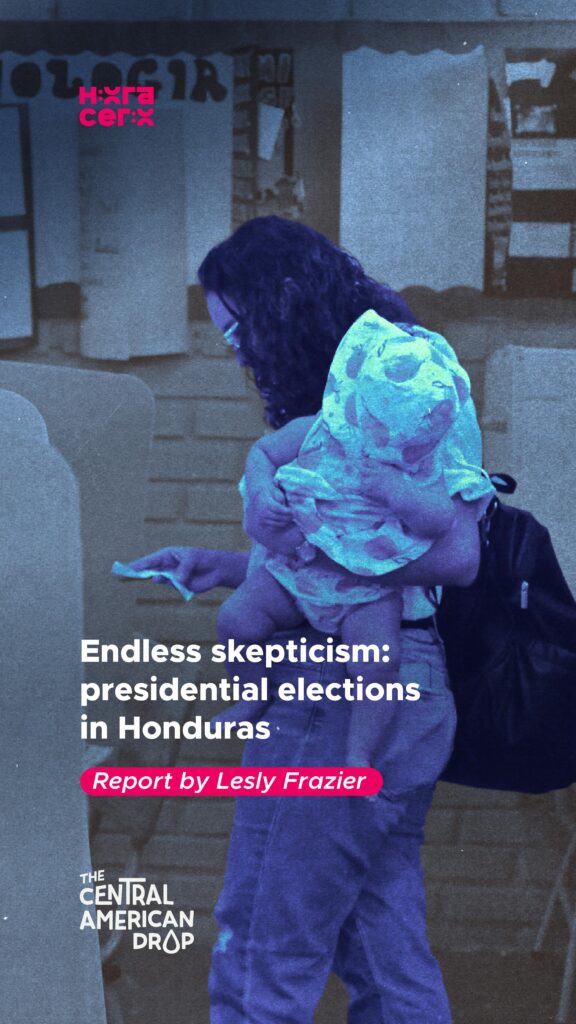
Every electoral process in Honduras renews the hope for change, but also reactivates deep-rooted distrust among citizens. Since 1981, the country has held 11 general elections under structures and regulations that, far from guaranteeing fair and credible processes, have proven to be inadequate.
Although the continued holding of elections could be interpreted as a sign of democratic maturity, it actually reflects the political system’s ability to perpetuate itself without any profound reforms. The institutional design has favored the retention of power by political parties without holding them accountable, and has hindered citizen participation and transparency.
The emergence of the Liberty and Refoundation Party (Libre) in 2013 marked a break with the historic National-Liberal two-party system. However, the emergence of a third party has not strengthened institutions or improved governance. On the contrary, human rights organizations and civil society representatives denounce that the three-party system has further fragmented the political landscape and hindered the consensus needed to advance electoral reforms.
The political analyst Elvin Hernández tells Hora Cero that electoral processes in Honduras have historically been fraudulent and opaque. «Candidates are not always elected by the population, but rather through agreements between party leaders,» he notes, pointing to a structurally weak democracy.
According to Hernández, the current electoral process repeats the vices of the past: «Voting will be carried out under laws that have favored the party leadership. The ruling party will use public funds as an electoral platform. There is no effective control over campaign financing, which allows the entry of funds from illicit or unknown sources.»
For Hernández, although high turnout in the 2021 elections was interpreted as a sign of democratic revitalization, subsequent actions by political actors deepened skepticism. It has become clear that voting alone does not transform a system whose rules remain unchanged.
The perception of manipulation, corruption, and abuse of power has severely eroded the legitimacy of the electoral system. According to the 2023 Democracy Index of The Economist, Honduras is classified as a hybrid regime, with a rating of 4.98 out of 10. Added to this is the data of the Probe of Public Opinion of the ERIC-SJ Reflection, Research and Communication Team. This survey reveals that more than 80% of the population has no confidence in political parties, the National Congress, or the National Electoral Council (CNE). Even so, eight out of ten people surveyed expressed their intention to vote in the upcoming elections.
Although more than 2 billion lempiras were allocated for the primary elections, and now more than 1.7 billion for the general elections with the goal of modernizing the electoral process with biometric technology and results transmission systems, the most urgently needed structural reforms were not addressed. Neither the implementation of a second round of voting, nor the separation of presidential and legislative elections, nor effective control of financing are on the agenda of decision-makers.
Hernández warns that the problem lies not only in the electoral system, but also in the behavior of the parties, institutions, and citizens. «We are facing a process where caudillismo and bipartisanship have distorted citizen participation, which now sees the process as an opportunity to receive favors, not to elect leaders committed to democracy.»
For Hernández, poor institutional quality undermines electoral legitimacy. «This deterioration is not attributable to a single actor. It has to do with the conduct of the parties, the weakness of institutions, and low public awareness.»
According to analyst Hernández, elections have been used as a tool by elites to maintain control in times of crisis. «They are the mechanisms elites use to protect their interests and ensure that public policies that benefit them are not compromised.»

The Constitution of the Republic of Honduras establishes that the National Electoral Council (CNE) is part of the electoral function, along with the National Registry of Persons and the Electoral Justice Tribunal. These three bodies are constitutionally delegated to organize electoral processes and implement direct democracy mechanisms, such as popular consultations.
The CNE is composed of three full councilors, who must be elected with the affirmative vote of at least 86 members of the National Congress. Since this is a parliamentary decision, it is inevitably politically charged. Historically, the composition of this body, formerly known as the Supreme Electoral Tribunal, has been based on a distribution of quotas among the parties with the largest electoral support.
The law establishes that the three full council members must alternate the presidency of the CNE each year. There are also two alternates, who are involved only if a member is absent. It is important to remember that the CNE is a collegiate body: its decisions are made in plenary sessions by simple majority (2 to 1) or unanimity (3 to 0). No council member may refuse to participate in the sessions, and if they vote against a decision, they have the right to explain their vote in writing, in accordance with the current Electoral Law. In theory, this is the ideal way for it to operate.
However, in practice, the CNE is composed of representatives from the three main political parties: the Liberal, the National, and Libre, making it a highly politicized institution. This partisan division directly affects public confidence in the electoral administration.
Before the primary elections, the CNE seemed to act with a certain unanimity. However, following the irregularities that arose in those elections, such as the late delivery of electoral materials at polling stations in Tegucigalpa and San Pedro Sula by up to 18 hours, the institution has shown clear signs of polarization and internal conflict.
“It is evident that the CNE has become a battlefield,” says Denis Gómez, former magistrate of the electoral body. The conflict lies in the behavior of those who comprise it: some act more like political activists than technical officials. «Although they come to office through party influence, they should take seriously the technical responsibility of administering legitimate elections.»
In the words of former councilor, when Rixi Moncada -currently a presidential candidate for the Libre party- was a CNE councilor, he declared: «The party sent me here to win the elections,» exposing how the parties send people to the CNE who they consider capable of ensuring their victory, rather than guaranteeing clean processes, which strengthen institutions and respect the popular will.
Currently, each party seeks to strategically position itself within the Council, not necessarily to commit fraud, but to protect its interests in the event of errors or irregularities. The mistrust between political actors is so deep that any oversight can generate conflicts over the allocation of votes or the interpretation of the results.
Since the 2009 coup d’état, as documented by the Truth and Reconciliation Commission, polarization has intensified and is now more pronounced than ever within the CNE. Instead of being a technical body, 300% reliable, representing the three main political forces, the Council has become trapped in internal struggles that prevent it from effectively fulfilling the functions assigned to it by the Constitution.
For former judge Gómez, simply maintaining the continuity of elections in a democratic manner is not enough. The crucial issue is that these elections meet electoral integrity standards, which include: «Administrative capacity of the CNE, transparency in the transmission and dissemination of results, reliable voter registration and data, and legitimacy in the selection of winners.»
The events of March 9th called into question the CNE’s technical capacity and damaged its public image. Today, unprecedented levels of politicization are observed. Technical areas, such as the Electoral Logistics Center, are also under partisan control, increasing the risk of manipulation.
According to former magistrate Denis Gómez this is indeed possible, but the current reality suggests otherwise. The ruling party has initiated public allegations of electoral fraud without solid evidence. Honduras is a country where complaints rarely translate into concrete action. This practice, far from strengthening the process, weakens voters’ confidence.
Given this scenario, the best possible scenario would be for the three CNE members to fully assume their technical role and, at least in the exercise of their functions, distance themselves from partisan logic. They must guarantee integrity at all stages of the electoral process: from voter registration, through the transmission of results, to the final declaration of the winners.
“Because it’s not enough to have elections. If there’s no integrity, there’s no democracy. And if the results aren’t legitimate, they can be rejected both inside and outside the country,” he said, noting that the situation is complex, but the public outcry must be clear: “Let whoever has popular support win, but let them do so legitimately and transparently.”
As Maritza Díaz finishes removing the water and sediment left by the recent flooding caused by the rising Ulúa River in La Duarte, El Progreso, Yoro, northern Honduras, she pauses, smiles ironically, and comments: “Those (political) bandits are going to come and leave us the little bags,” —referring to food— “so we’ll vote for them.” She explains that every year her community floods with even the slightest rise in the river because neither the central nor the local government has repaired the containment banks, especially the relief canal near Campo Amapa, demonstrating that they have never cared about families losing their livelihoods time and time again.
She is 52 years old and lives with her three children, a daughter-in-law, and a two-year-old grandson. She says she’s tired of the floods, of having to remove mud from her house, and of continuing to hear political promises that never materialize. Despite everything, Díaz participated in the internal elections or primaries on March 9th, and assures, with a smile, that she will also vote in the general elections in November. However, faced with the reality she faces, an inevitable question arises: How can she be willing to vote under these conditions?
According to an opinion poll conducted by Eric-sj, 8 out of 10 Hondurans say they will vote in the general elections on November 30, 2025, despite their mistrust of the electoral process and political parties. Even so, they continue to believe in participatory democracy and elections as a fundamental pillar of that democracy.
In the end, Maritza Díaz told us that she doesn’t belong to any political party. She always votes for the person she thinks is more or less decent, but she ends up disillusioned, saying, «They’re all equally thieving; only their political affiliation changes.» She is convinced that if she doesn’t vote, the poll workers will do it for her. With this statement, she alludes to the many complaints that have arisen throughout the electoral process and, ironically, coined the well-known phrase: «In Honduras, even the dead vote.» She laughs and continues to remove the water and mud from her house in the hope that one day it will be removed from the entire country.

| Cookie | Duración | Descripción |
|---|---|---|
| cookielawinfo-checkbox-analytics | 11 months | This cookie is set by GDPR Cookie Consent plugin. The cookie is used to store the user consent for the cookies in the category "Analytics". |
| cookielawinfo-checkbox-functional | 11 months | The cookie is set by GDPR cookie consent to record the user consent for the cookies in the category "Functional". |
| cookielawinfo-checkbox-necessary | 11 months | This cookie is set by GDPR Cookie Consent plugin. The cookies is used to store the user consent for the cookies in the category "Necessary". |
| cookielawinfo-checkbox-others | 11 months | This cookie is set by GDPR Cookie Consent plugin. The cookie is used to store the user consent for the cookies in the category "Other. |
| cookielawinfo-checkbox-performance | 11 months | This cookie is set by GDPR Cookie Consent plugin. The cookie is used to store the user consent for the cookies in the category "Performance". |
| viewed_cookie_policy | 11 months | The cookie is set by the GDPR Cookie Consent plugin and is used to store whether or not user has consented to the use of cookies. It does not store any personal data. |